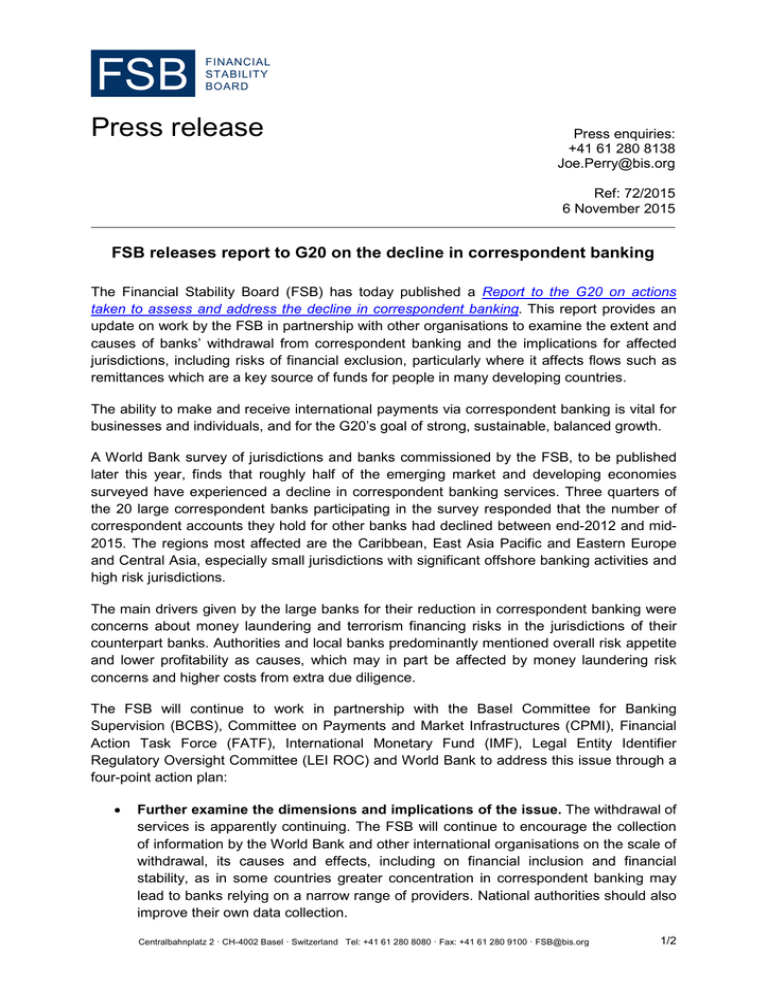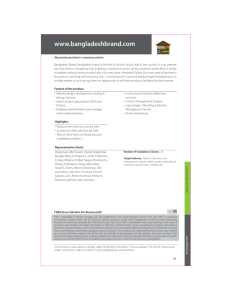Press release
advertisement

Press release Press enquiries: +41 61 280 8138 Joe.Perry@bis.org Ref: 72/2015 6 November 2015 FSB releases report to G20 on the decline in correspondent banking The Financial Stability Board (FSB) has today published a Report to the G20 on actions taken to assess and address the decline in correspondent banking. This report provides an update on work by the FSB in partnership with other organisations to examine the extent and causes of banks’ withdrawal from correspondent banking and the implications for affected jurisdictions, including risks of financial exclusion, particularly where it affects flows such as remittances which are a key source of funds for people in many developing countries. The ability to make and receive international payments via correspondent banking is vital for businesses and individuals, and for the G20’s goal of strong, sustainable, balanced growth. A World Bank survey of jurisdictions and banks commissioned by the FSB, to be published later this year, finds that roughly half of the emerging market and developing economies surveyed have experienced a decline in correspondent banking services. Three quarters of the 20 large correspondent banks participating in the survey responded that the number of correspondent accounts they hold for other banks had declined between end-2012 and mid2015. The regions most affected are the Caribbean, East Asia Pacific and Eastern Europe and Central Asia, especially small jurisdictions with significant offshore banking activities and high risk jurisdictions. The main drivers given by the large banks for their reduction in correspondent banking were concerns about money laundering and terrorism financing risks in the jurisdictions of their counterpart banks. Authorities and local banks predominantly mentioned overall risk appetite and lower profitability as causes, which may in part be affected by money laundering risk concerns and higher costs from extra due diligence. The FSB will continue to work in partnership with the Basel Committee for Banking Supervision (BCBS), Committee on Payments and Market Infrastructures (CPMI), Financial Action Task Force (FATF), International Monetary Fund (IMF), Legal Entity Identifier Regulatory Oversight Committee (LEI ROC) and World Bank to address this issue through a four-point action plan: • Further examine the dimensions and implications of the issue. The withdrawal of services is apparently continuing. The FSB will continue to encourage the collection of information by the World Bank and other international organisations on the scale of withdrawal, its causes and effects, including on financial inclusion and financial stability, as in some countries greater concentration in correspondent banking may lead to banks relying on a narrow range of providers. National authorities should also improve their own data collection. Centralbahnplatz 2 · CH-4002 Basel · Switzerland Tel: +41 61 280 8080 · Fax: +41 61 280 9100 · FSB@bis.org 1/2 • Clarifying regulatory expectations, as a matter of priority, including more guidance by the FATF on the application of standards for anti-money laundering and combating the financing of terrorism (AML/CFT) to correspondent banking, especially on the customer due diligence expectations for correspondent banks when faced with respondent banks in “high-risk scenarios”, as well as additional work on remittances, financial inclusion and non-profit organisations. The FATF aims to complete its work on these four projects at its Plenary meetings of June and October 2016, in cooperation with the BCBS, which has issued guidance on correspondent banking, and other bodies. The FSB will continue to support coordination in this area, especially in areas that go beyond the scope of individual standard-setters, such as the interaction with data protection issues or the wider issue of incentives in business conduct. • Domestic capacity-building in jurisdictions that are home to affected respondent banks, building upon assessments and technical assistance from the international financial institutions, the FATF and FATF-style regional bodies and the sharing of best practices within the financial industry, including by global correspondent banks with local banks. Assessments and technical assistance will help identify and address deficiencies before these result in a reduced access to the global financial system. The FSB will continue to facilitate dialogue among banks and authorities. • Strengthening tools for due diligence by correspondent banks. This includes correspondent bank information sharing, through Know Your Customer facilities and broader use of the global Legal Entity Identifier (LEI). The Committee on Payments and Market Infrastructures and the LEI ROC have made proposals in these areas. In cooperation with other relevant stakeholders, the FSB will develop by February 2016 a plan for promoting the use of the LEI by all banks involved in correspondent banking. Notes to editors The FSB has been established to coordinate at the international level the work of national financial authorities and international standard setting bodies and to develop and promote the implementation of effective regulatory, supervisory and other financial sector policies in the interest of financial stability. It brings together national authorities responsible for financial stability in 24 countries and jurisdictions, international financial institutions, sector-specific international groupings of regulators and supervisors, and committees of central bank experts. Through the six regional groups, the FSB conducts outreach with another approximately 65 jurisdictions. The FSB is chaired by Mark Carney, Governor of the Bank of England. Its Secretariat is located in Basel, Switzerland, and hosted by the Bank for International Settlements. For further information on the FSB, visit the FSB website, www.fsb.org. 2/2




